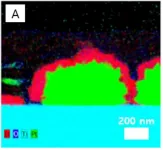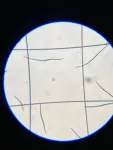(Press-News.org)
The world is getting hotter, causing shifts in seasonal patterns and increasing the amount of extreme weather such as severe droughts and heat waves, which can affect crop yields and food supplies. A recent study led by a researcher at the Friedman School of Nutrition Science and Policy at Tufts University found that the likelihood of extreme temperatures that could affect crop yields has increased significantly in wheat-producing regions of the U.S. and China.
The findings predict heat waves that happened approximately once every hundred years in 1981 are now likely to happen once every six years in the Midwestern U.S. and once every 16 years in Northeastern China. The work shows the range of conditions that people need to prepare for, even if they haven’t occurred yet.
“The historical record is no longer a good representation of what we can expect for the future,” said Erin Coughlan de Perez, Dignitas Associate Professor at the Friedman School and lead author on the paper, which published June 2 in npj Climate and Atmospheric Science. “We live in a changed climate and people are underestimating current day possibilities for extreme events.”
According to the most recent report from the Intergovernmental Panel on Climate Change, the average global surface temperature in the last decade was 1.1 degrees Celsius higher than it was between 1850 and 1900. To evaluate how this has changed our risk of extreme weather, Coughlan de Perez and her colleagues collected a large group of seasonal forecasts from the past 40 years. They used this ensemble to generate thousands of possible variations in temperature and rainfall, essentially showing all the things that could have happened in a given year. With this method, known as the Unprecedented Simulated Extreme Ensemble or UNSEEN approach, the researchers were able to estimate the likely frequency of extreme temperatures that exceed critical growth thresholds for wheat.
Winter wheat crops start their growth in the fall and are harvested the following summer. High temperatures in spring, when the plant is flowering, can affect the wheat’s development. At temperatures over 27.8 degrees Celsius (about 82 degrees Fahrenheit), the plants start to suffer from heat stress. At temperatures over 32.8 degrees Celsius (about 91 degrees Fahrenheit), important enzymes in the wheat start to break down.
“In the Midwest, we used to have seasons where you’d see an average of maybe four or five days of that enzyme breakdown threshold being exceeded—it was pretty uncommon,” said Coughlan de Perez, who is also part of the Feinstein International Center at the Friedman School. “But our research showed possible alternative realities of today’s climate that generated 15 days above this threshold, which we surmise would be very damaging.”
Record-breaking heat also tends to be associated with record-breaking drought, Coughlan de Perez said. The combination of these two hazards could severely impact the growing season. Both the U.S. and China are considered global breadbaskets—areas that produce significant amounts of the world’s grains. If these crops were to fail simultaneously, or at the same time as other staple crops, it could have serious impacts on the price and availability of food around the world.
The results indicate that both regions have been lucky in recent years. There is an aspect of randomness to weather—a range of possibilities could occur, sort of like when you roll a six-sided die. So far, these regions have been rolling fairly low numbers, ending up with cooler weather than they could have had. But climate change has switched out the die—the highest number is bigger than it used to be. These regions haven’t experienced the full extent of what is possible, and they might not be ready for it.
“My hope is that we can tell people that their die has changed. You can roll something really extreme,” Coughlan de Perez said. “Maybe you won’t roll an eight for a while, but I think it’s worth having some plans in place for when that happens.”
The researchers also identified regional and global atmospheric circulation patterns that could lead to severely hot and dry events, including a possible worst-case scenario where wheat production in both the U.S. and China is hit hard in the same season. Their results can help inform climate adaptation plans in these regions and ensure that stakeholders can prepare for the unprecedented events to come.
“I think, with climate change, we’re suffering from a failure of imagination. If we’re not imagining the kinds of extremes that could happen, then we won’t prepare for them,” Coughlan de Perez said. “We don’t have to be surprised. We can use tools at our disposal to try to understand what’s possible and be ready when it happens.”
Research reported in this article was supported by NASA cooperative grant Today’s Risk of Extreme Events under award 80NSSC22K1706. Complete information on authors, funders, and conflicts of interest is available in the published paper.
The content is solely the responsibility of the authors and does not necessarily represent the official views of the funders.
END
New theoretical research by Michael Wondrak, Walter van Suijlekom and Heino Falcke of Radboud University has shown that Stephen Hawking was right about black holes, although not completely. Due to Hawking radiation, black holes will eventually evaporate, but the event horizon is not as crucial as had been believed. Gravity and the curvature of spacetime cause this radiation too. This means that all large objects in the universe, like the remnants of stars, will eventually evaporate.
Using a clever combination of quantum physics and Einstein’s theory of gravity, Stephen Hawking argued that the spontaneous creation and annihilation ...
Human activity has degraded ecosystems and damaged biodiversity around the world, but ecosystem restoration offers hope for the future. Scientists studying the restoration of underwater seaweed forests which provide other species with food and shelter have found that 10 years of restoration efforts have helped a damaged forest regrow to richness and strength comparable to forests that have never been disturbed.
“Macroalgal forests are found along over one-third of the world’s coastlines and underpin ...
Green hydrogen, which produces hydrogen without the use of fossil fuels or the emission of carbon dioxide, has become increasingly important in recent years as part of efforts to realize a decarbonized economy. However, due to the high production cost of water electrolysis devices that produce green hydrogen, the economic feasibility of green hydrogen has not been very high. However, the development of a technology that drastically reduces the amount of rare metals such as iridium and platinum used in polymer electrolyte membrane water electrolysis devices is opening the way to lower production costs.
A research team led by Dr. Hyun S. Park and Sung Jong ...
Sarcomas
Dr. Jonathan C. Trent, a medical oncologist specializing in Sarcoma and Connective Tissue Medical Oncology at Sylvester, is available to discuss a wide range of issues related to Sarcoma research and experimental therapeutics. He and collaborators are involved in multiple ASCO23 presentations, including:
Multi-omic characterization of gastrointestinal stromal tumor (GIST) in a large real-world patient cohort.
Outcomes in patients with advanced gastrointestinal stromal tumor who did not have ...
Adolescents who show signs of alcohol dependence are more likely to develop depression by their mid-20s, according to a new study led by UCL (University College London) and University of Bristol researchers.
Drinking large amounts of alcohol regularly, but with no signs of dependency, did not predict depression risk, according to the findings published in The Lancet Psychiatry.
Co-lead author Dr Gemma Lewis (UCL Psychiatry) said: “By using a large, longitudinal dataset, we have found evidence that problematic drinking patterns in late adolescence may increase the risk of developing ...
The UK’s growing mismatch between the fish we catch and the fish we want to eat has clear implications for our future food security, according to new research.
Led by the University of Essex and the Centre for Environment Fisheries and Aquaculture Science (Cefas), the study, published in the international peer-reviewed journal Reviews in Fish Biology and Fisheries, for the first time offers a comprehensive, long-term analysis of how major policy changes in the past 120 years have influenced patterns in UK seafood production, trade and consumption.
It shows that even if we changed our fish-eating habits away from choosing flaky white fish such as cod ...
A new study of 3,745 families from across the UK demonstrates a “sizeable” gap in the financial knowledge of children depending on which socio-economic group they come from.
The research highlights significant inequalities in young people’s financial capabilities, with the results pointing toward disadvantaged children not developing key financial skills.
In findings published in the peer-reviewed British Journal of Educational Studies, an expert team from UCL are calling for a greater emphasis on developing financial skills amongst children starting at primary school, particularly aimed towards those from disadvantaged social backgrounds, with “a particular need ...
DOWNLOADABLE B-ROLL/VIDEO
MIAMI, FLORIDA (June 1, 2023) – Historically, surgery was the first line of treatment for patients with thyroid cancer. Now, as targeted therapies and other new medications emerge, surgery for certain patients may become more of a secondary option if those treatments fail. This new context could potentially change how some procedures are conducted.
Otolaryngologist and head and neck surgeon Dr. Zoukaa Sargi, will join a June 2 panel discussion on thyroid cancer care ...
In a multicenter phase 1 and 2 trial (BRUIN, NCT03740529), researchers from leading cancer centers across the globe, including the Medical College of Wisconsin (MCW) in Milwaukee, tested Bruton tyrosine kinase inhibitor (BTKi), pirtobrutinib, in patients with pre-treated mantle cell lymphoma (MCL). Results of the study, which assessed the efficacy of the drug in a cohort of 90 patients with poor survival prognosis, demonstrated the reversible BTKi drug to be both safe and effective in achieving inhibition of defective B-cells. The results were published by the Journal of Clinical Oncology on May 16.
MCL is an aggressive, rare subtype of ...
Beech leaf disease is an emerging threat to North American forest ecosystems. It was first discovered in northeastern Ohio in 2012, and has already spread to 12 additional U.S. states and Canadian provinces. At first the cause of the disease was unknown, and the sick and dying trees were diagnosed on symptoms alone: Dark banding along the leaf veins and shriveled, leathery leaves. But in 2017, nematodes were found in diseased leaves, and by 2020 we had the answer: A newly recognized subspecies of the wormlike creature, Litylenchus crenatae mccannii, was definitely associated with the symptoms.
In order to monitor the spread of the disease, to understand the nemotode’s ...


